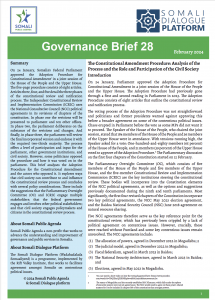On 24 January, Somalia’s Federal Parliament approved the ‘Adoption Procedure for Constitutional Amendment’ in a joint session of the House of the People and the Upper House. The five-page procedure consists of eight articles. Articles three, four, and five detail the three phases of the constitutional review and ratification process. The Independent Constitutional Review and Implementation Commission (ICRIC) uses the National Consultative Council (NCC) political agreements in its revisions of chapters of the constitution. In phase one the revisions will be presented to parliament and ten other offices. In phase two, the parliament deliberates on the substance of the revisions and changes. And finally, in phase three, the parliament will review the final incorporated version and endorse it with the required two-thirds majority. The process offers a level of participation and input for the parliament, other government institutions, and civil society. However, some politicians opposed the procedure and how it was voted on in the parliament. This brief analyses the Adoption Procedure for the Constitutional Amendment and the actors who opposed it. It explores ways that civil society can contribute to and influence the constitutional review process and concludes with several policy considerations. These include the suggestions that the Parliamentary Oversight Committee (OC) and ICRIC engage multiple stakeholders; that the federal government engages and involves other political stakeholders; and that civil society engages policymakers and citizens in the constitutional review process.
This briefing is a product of the Somali Dialogue Platform in collaboration with the Somali Public Agenda. The Somali Dialogue Platform is a programme which supports Somalis to achieve consensus on contentious political issues and is implemented by the Rift Valley Institute. The Somali Dialogue Platform is funded by the UK Foreign, Commonwealth and Development Office (FCDO), the Ministry of Foreign Affairs of Denmark, and the United States Agency for International Development (USAID).



